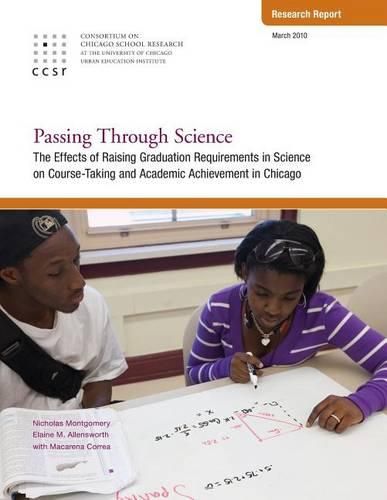Readings Newsletter
Become a Readings Member to make your shopping experience even easier.
Sign in or sign up for free!
You’re not far away from qualifying for FREE standard shipping within Australia
You’ve qualified for FREE standard shipping within Australia
The cart is loading…






This report finds that a Chicago Public Schools (CPS) policy dramatically increasing science requirements for all students did not help them learn more science and actually may have hurt their college prospects. The science policy was part of a larger CPS initiative to expose all students to a college-preparatory curriculum by increasing course requirements across a range of subjects. To examine the effect of the 1997 policy change, the report compares academic outcomes for cohorts of students in Chicago before and after the policy switch. The new science policy did end low expectations for science coursework, the report finds. Two years before the change, less than half of CPS graduates passed three or more college-prep science courses; most did not complete more than one. Immediately after the change, almost all graduates passed at least three full-year science classes. However, though CPS high school students took and passed more college-prep science courses under the new policy, five out of six of them earned Cs or lower, the same low grades they earned before the policy switch. Graduation rates also declined after the policy change. They dropped by four percentage points in the first year of the policy and another percentage point in the next year, after accounting for changes in the backgrounds and prior achievement of students entering CPS high schools. What’s more, most graduates still did not complete all of the high-level science courses expected at selective colleges, and college-going rates ultimately declined among graduates with a B average or better in science. Because of the way the policy was structured, students were less likely after the policy to take both physics and chemistry, a combination that is common for students aspiring to college nationally.
$9.00 standard shipping within Australia
FREE standard shipping within Australia for orders over $100.00
Express & International shipping calculated at checkout
This report finds that a Chicago Public Schools (CPS) policy dramatically increasing science requirements for all students did not help them learn more science and actually may have hurt their college prospects. The science policy was part of a larger CPS initiative to expose all students to a college-preparatory curriculum by increasing course requirements across a range of subjects. To examine the effect of the 1997 policy change, the report compares academic outcomes for cohorts of students in Chicago before and after the policy switch. The new science policy did end low expectations for science coursework, the report finds. Two years before the change, less than half of CPS graduates passed three or more college-prep science courses; most did not complete more than one. Immediately after the change, almost all graduates passed at least three full-year science classes. However, though CPS high school students took and passed more college-prep science courses under the new policy, five out of six of them earned Cs or lower, the same low grades they earned before the policy switch. Graduation rates also declined after the policy change. They dropped by four percentage points in the first year of the policy and another percentage point in the next year, after accounting for changes in the backgrounds and prior achievement of students entering CPS high schools. What’s more, most graduates still did not complete all of the high-level science courses expected at selective colleges, and college-going rates ultimately declined among graduates with a B average or better in science. Because of the way the policy was structured, students were less likely after the policy to take both physics and chemistry, a combination that is common for students aspiring to college nationally.